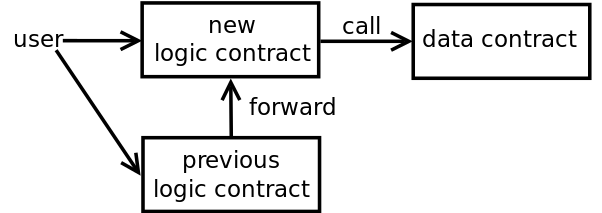Data Separation

```js
contract Logic {
Data data;
function inc() public{
data.setV(data.v() + 1);
}
function v() public
returns(uint){
return data.v();
}
}
```
```js
contract Data is Owner {
uint public v;
function setV(uint new_v)
onlyOwner
public {
v = new_v;
}
}
```
Data storage strategy: key value pair
```js
contract DataContract is Owner {
mapping(bytes32 => uint) uIntStorage;
function getUint(bytes32 key) view public returns(uint) {
return uintStorage[key];
}
function setUint(bytes32 key, uint new_val) onlyOwner public {
uintStorage[key] = new_val;
}
}
```
It is also known as Eternal storage
Data separation: Recommendations
- Define clear separation between data and logic
- Keep simple implementation
- Avoid complex data storage (ex: key-value pair)
- Define the upgrade procedure
- How to upgrade the contracts? Pause contracts
- How to store keys
- How to communicate with users
How to Upgrade (Solution : 1)
Upgrade: deploy new logic contract and disable old one

How to Upgrade (Solution: 2)
Upgrade: deploy new logic contract and forward call

Data Separation: alternative
Use of third proxy contract
- Provide constant entry point for users

EVM Internals
- EVM has a hardvard architecture
- Section code != Section data
- A contract can
- Call another contract
- A contract cannot
- Write directly to another contract's data
Delegatecall Example
```js
contract Proxy{
uint public a;
address public pointer;
...
function () public {
pointer.delegatecall(..)
}
}
```
```js
contract MyContract_V1 {
uint public a;
address public pointer;
function set(uint val) public {
a = val;
}
}
```

Delegatecall Example
```js
contract Proxy{
uint public a;
address public pointer;
...
function () public {
pointer.delegatecall(..)
}
}
```
```js
contract MyContract_V1 {
uint public a;
address public pointer;
function set(uint val) public {
a = val;
}
}
```

```js
contract MyContract_V2 {
uint public pointer;
address public a;
function set(uint val) public {
a = val;
}
}
```
Delegatecall Example
```js
contract Proxy{
uint public a;
address public pointer;
...
function () public {
pointer.delegatecall(..)
}
}
```
```js
contract MyContract_V1 {
uint public a;
address public pointer;
function set(uint val) public {
a = val;
}
}
```

```js
contract MyContract_V2 {
uint public pointer;
address public a;
function set(uint val) public {
a = val;
}
}
```
Examples of incorrect upgrades
